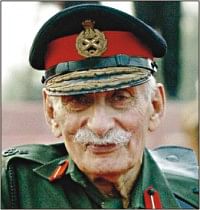Manekshaw passes away

Field Marshal Sam Manekshaw, who was the chief of Indian army during the Bangladesh's War of Independence in 1971, died at a military hospital in Wellington in the southern state of Tamil Nadu late on Thursday night. He was 94.
Manekshaw had been in hospital for several days battling lung disease.
He was the architect of India's greatest military victory against Pakistan in the 1971 war.
Manekshaw had developed broncho-pneumonia and associated complications and he slipped into coma four days ago. A specialist from the military hospital in Delhi was flown to assist doctors attending on him at the hospital in Wellington, a hill station, where Manekshaw had settled after retirement.
Manekshaw's two daughters--Maya and Sherry--were by his side when his end came. His wife Siloo died seven years ago.
Manekshaw, honoured with the Military Cross during the World War II, was the first Indian officer to command the Gorkhas after independence. For his close association with the Gorkha Rifles, he was called "Sam Bahadur".
Born in Amritsar on April 3, 1914, Manekshaw was commissioned in the army from the first course of Indian Military Academy in Dehra Dun in 1934. He became the army chief on June 7, 1969 and was the first officer to be decorated with the title of Field Marshal after the 1971 war with Pakistan. He was conferred the rank of Field Marshal, the highest military honour, on January 1, 1973.
Manekshaw was only the second Indian military officer to hold the rank of Field Marshal, the other being Gen K M Cariappa.
Handsome, witty and sporting his trademark handlebar moustache, Manekshaw had his way with people, including his seniors and even former Prime Minister Indira Gandhi.
The career of Field Marshal Sam Hormusji Framji Jamshedji Manekshaw spanned four decades and five wars, including the Second World War.
Becoming the army chief in 1969, the Indian forces under his command wrapped up a spectacular victorious campaign during the Indo-Pakistan War of 1971.
During World War II, Manekshaw saw action in the Burma campaign on Sittang river as a Captain with the 4/12 Frontier Force Regiment and has the rare distinction of being honoured for his bravery on the battle front.
During World War II, he was leading a counter-offensive against the invading Japanese Army in Burma. As he charged forward with his men, a Japanese soldier suddenly emerged from the bushes and fired at him, wounding him seriously in the stomach.
Major General DT Cowan spotted Manekshaw holding on to life and was aware of his valour in face of stiff resitance from the Japanese. Fearing the worst, Major General Cowan quickly pinned his own Military Cross ribbon on to Manekshaw saying, "A dead person cannot be awarded a Military Cross".
Having recovered from those near-fatal wounds in Burma, Manekshaw went for a course at Staff College, Quetta and later also served there as an instructor before being sent to join 12 Frontier Force Rifles in Burma. He was once again involved in a fierce battle with the Japanese and was wounded for a second time.
Manekshaw showed acumen for planning and administration while handling the issues related to the partition in 1947 and later put to use his battle skills during the 1947-48 Jammu and Kashmir Operations.
Manekshaw's years of military experience were put to the test as thousands of refugees from the erstwhile East Pakistan crossed over to India due to the turbulent situation there. The situation got worse, and soon erupted into a full-scale war in December 1971.
During this war, Manekshaw displayed uncommon ability to motivate the forces, coupling it with a mature war strategy. The war ended with Pakistan's unconditional surrender, and the formation of Bangladesh. He masterminded the rout of the Pakistan Army in one of the quickest victories in the recent military history.
Indian President Pratibha Patil and Defence Ministeri A K Antony condoled Manekshaw's death and paid rich tributes to him.
Antony said Manekshaw "had a rare knack of motivating the jawans and was a man of ideas and action. He led from the front in the 1971 war and on several other occasions".
"His demise has left behind a void that will be really hard to fill. Field Marshal Manekshaw will be fondly remembered by our Armed Forces and the nation alike", Antony said.

 For all latest news, follow The Daily Star's Google News channel.
For all latest news, follow The Daily Star's Google News channel. 



Comments